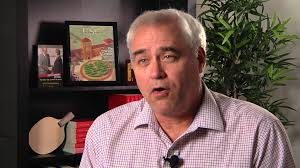
After two decades of negotiations, the end game of the struggle between the US and China on listed companies at the NYSE and Nasdaq seems to head into a delisting of 200 listed Chinese firms. Accounting expert Paul Gillis looks back at twenty years of tug wars at Market Place. Moving home, like to the Hong Kong Exchange, might not solve the need for capital, according to Gillis. “The Hong Kong exchange has arguably less liquidity than the U.S. exchanges,” Gillis said. “The investors may find it a little more difficult to get good prices when they’re selling stock.”
Market Place:
Allegations of fraud against U.S.-listed Chinese firms stretch back to the 2000s, when private firms from China began listing on U.S. stock exchanges, according to Paul Gillis, an accounting professor at Peking University’s Guanghua’s School of Management in Beijing.
“Some of them were just outright frauds, and the short sellers attacked these companies in the mid-2000s and had great success at bringing them down,” Gillis said. “That got the attention of U.S. regulators who wanted to try to protect investors by stopping that fraud.”
It has been difficult because China’s government has blocked these efforts…
Under the 2002 Sarbanes-Oxley Act, the Public Company Accounting Oversight Board was created to set audit rules for companies listed on U.S. stock exchanges. The PCAOB also has the power to inspect and enforce the rules. It does not interact with listed companies directly, but instead the PCAOB oversees the auditors.
“When [auditors] do an audit, [they] prepare a set of working papers that document what work they have done to reach the conclusion that the financial statements are correct,” Gillis said.
The PCAOB wants full access to the working papers, but China’s government says this could threaten its national security…
The U.S. worries that China’s definition of state secrets can be broad.
“The PCAOB was able to negotiate the ability to do inspections in every country, except for China,” Gillis said. “China’s also one of the few countries that uses the U.S. capital markets as extensively as it does.”
Negotiations have been on and off for the past 20 years…
“There has been a lot of people who seem to think that these PCAOB inspections are going to be some kind of magic bullet that is going to make fraud in Chinese companies go away,” accounting professor Gillis said. “I don’t believe that is true.”
Chinese firms in need of capital can turn to other stock exchanges, but they are not as appealing. Mainland China’s markets are underdeveloped. Hong Kong’s stock exchange might be the next best alternative to the United States. A few firms are moving in that direction already, but not all U.S.-listed Chinese companies are eligible to list in Hong Kong. American investors can buy stocks of Chinese firms in Hong Kong, though that prospect may not be very attractive.
“The Hong Kong exchange has arguably less liquidity than the U.S. exchanges,” Gillis said. “The investors may find it a little more difficult to get good prices when they’re selling stock.”
Paul Gillis is a speaker at the China Speakers Bureau. Do you need him at your (online) meeting or conference? Do get in touch or fill in our speakers’ request form.
Are you looking for more financial experts at the China Speakers Bureau? Do check out this list.


